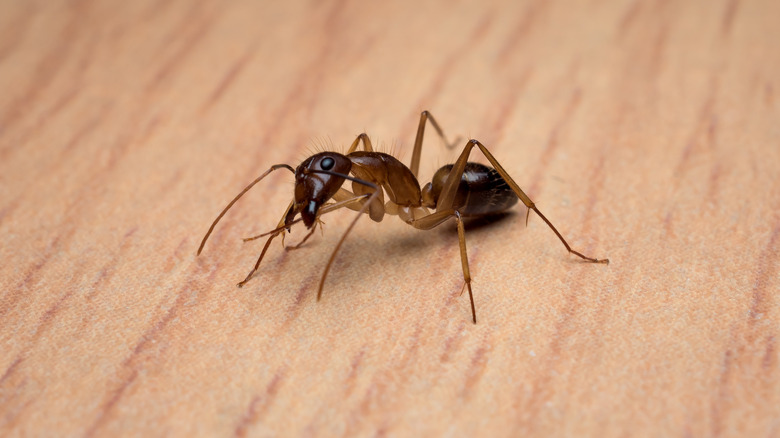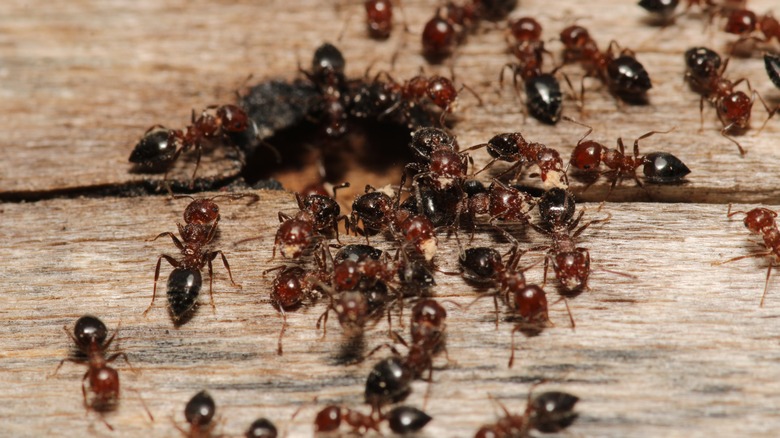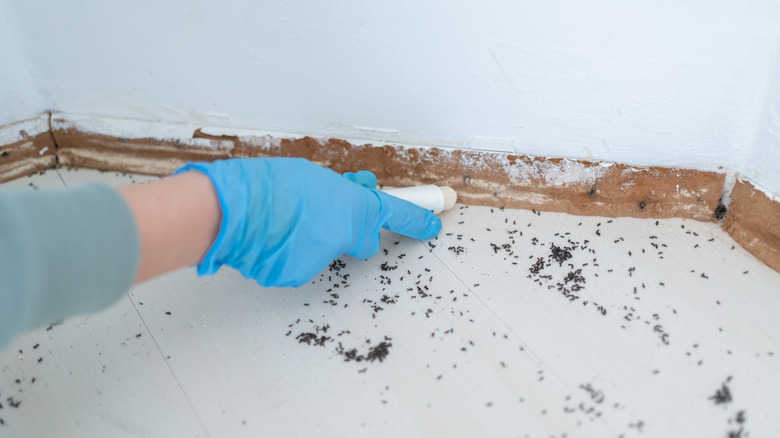The Best Ways To Banish Carpenter Ants From Your Home
An ant may well destroy a whole dam, as the saying goes, and you're definitely not going to sit idly by as an army of carpenter ants plunder your house. Once you've confirmed the signs that these insects have invaded your space, it's time to take action before their population explodes. And while carpenter ants don't consume wood, if left for long enough they can wreak havoc by chipping away at wooden frames and other infrastructure. As the insects sharpen their teeth, homeowners prepare their arsenal for attack. But as Sun Tzu writes in the epic "The Art of War," "If you know the enemy and know yourself, you need not fear the result of a hundred battles." So it's imperative that when we declare war on a subspecies of the Formicidae clan, we get to know their innermost workings.
Carpenter ants are creatures of habit, and it is solely by knowing how and why they operate the way they do that we can guarantee success. While various species have different patterns, they all seek the same basic necessities: a source of water, food, and shelter. If you can pinpoint these resources within your own home and yard, you've already won half the battle. But just like a game of chess, decimating a colony of ants could come down to defeating its queen and knowing what its next move will be.
Why baiting works in a war against ants
For the carpenter ant, there is only one queen, a gyne, that can carry their progeny. Without this fertile female, the colony simply cannot repopulate. But interestingly enough, there may be more nests than just the parent colony where the queen ant lays her eggs. There may also be other satellite nests that contain pupae, larvae, and more ant workers. For all carpenter species, no matter where their center of operations is located, they must forage and bring resources to the parent nest. This is the reason baiting is a powerful method of destroying and dealing with ant nests.
Sun Tzu writes, "He will win who, prepared himself, waits to take the enemy unprepared." Setting baits for carpenter ants is exactly the kind of patient strategy that can be successful in a battle against these pests. Since the insects gather food and other resources, baiting allows the unsuspecting workers to introduce active lethal chemicals to their nests. One scientific study published by Texas A&M University in Instars: A Journal of Student Research found that it's best to use a combination of protein and carbohydrate (sometimes called sugar) traps, even though the ants actually seemed to prefer carbohydrate-based ones. It also makes sense that to increase the chance of colony contamination, you should place baits both inside and outside the home.
Bug out with long-lasting non-repellant spray
If nothing else, you can rely on an ant's habits and take their steady, predictable nature to the bank. Ants are notorious for the way they scavenge for their resources. Usually, a solitary scout will set out on a mission to find a food source, and once it identifies one, it takes a portion of it back to its nest. It leaves an odor trail so ants returning to the food source can find their way easily. One Journal of Experimental Biology study revealed that once the insects found the pheromone trail, they placed their antennae alongside the path as they moved along it. Using this knowledge is crucial to eliminating carpenter ants.
Non-repellant sprays outperform their repellant counterparts. The latter immediately kills the insects and leaves a mass destruction of ants in its wake. Like soldiers on the lookout, worker ants that are close to the bug genocide will avoid the trail and find a new path to take. In the case of non-repellent insecticides, the chemicals cling to the pests, who then take it to their nests. There, they spread the insecticide before eventually succumbing to it. Another benefit of these sprays is that some are still potent for seven years after they were first used. No wonder they advise that these products can only be used outdoors. Luckily, there are also some natural methods to get rid of ants should you want to take another approach.


